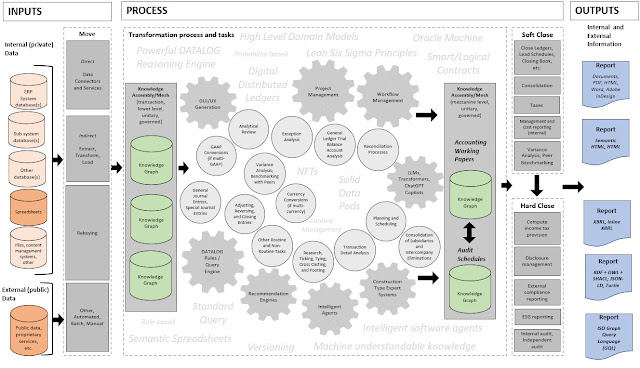Sensemaking is the process of determining the deeper meaning or significance or essence of the collective experience for those within an area of knowledge. My superpower seems to be sensemaking.
My system of interest was the general purpose financial statement. That system of interest has now expanded to the entire "record-to-report" process from the general journal, to accounting working papers and schedules, audit working papers and schedules, and ultimately then the financial report. Effectively this includes the "work", improvements to that work process, and the final output which is that general purpose financial statement. This excludes, for the time being, subsidiary journals and ledgers.
Here is a graphic of my system of interest from a couple of years back: (click here for larger view)
Microsoft CEO Satya Nadella and
Nvidia CEO Jensen Huang a predicting a monumental shift in how work is performed. For what it is worth, I agree with them. Huang says, in part, "...the technology divide can be completely closed...". He is absolutely right, that gap can be completely closed. But the real work needs to be done.
Who will close that gap for accountants? Accountants. Not all accountants. Some accountants; those that took the time to understand "
digital".
Accountants are excellent at operating systems. It has been my experience as an accounting information systems specialist that the typical accountant is not as adept at creating or improving accounting information systems. My observation is that many accountants commonly have trouble setting up an appropriate chart of accounts. So I would not really expect the typical accountant to understand what is about to happen to "work" and "workflow" or to be able to create a new approaches to performing work or enabling a workflow.
However, when someone shows the typical accountant a new and improved way to work and workflow that is based on machine-understandable
knowledge representations (KR) that interact with intelligent software agents; they will "get it, get it". Accountants are very smart people; they are just very conservative and skeptical when it comes to new things. And frankly, I tend to be on the skeptical side myself.
But I also know a good thing when I see it and I have developed the skills and abilities and have accumulated the experience to adequately evaluate software and understand the real capabilities of software, seeing through the hype of the snake oil salesmen.
Imagine accountancy where many of the mundane, monotonous, even grueling work tasks no longer need to be performed by humans; tools will take over that lower non-value add work such that humans can focus on the higher value add tasks and processes.
KR + agents will help make this a reality. What
lighthouse projects are you involved in to help show the way? It is very, very hard to understand potential if you are not doing some sort of experimentation and exploration out on the frontier to understand what is going on.
Additional Information:




Comments
Post a Comment